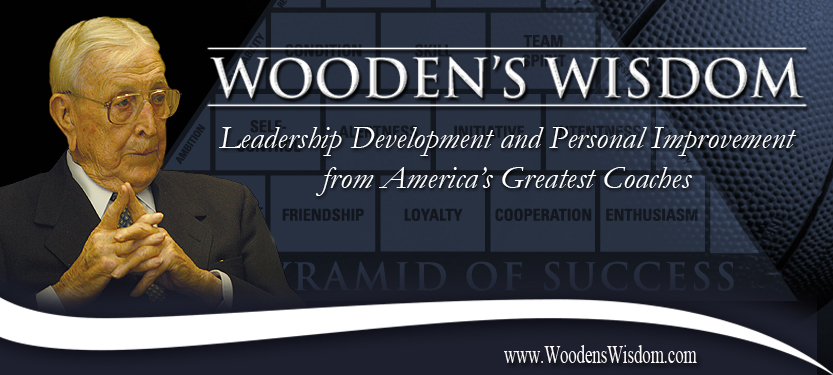 |
|
| Wooden's Wisdom - Volume 4 | Issue 161 |
| Craig Impelman Speaking | Championship Coaches | Champion's Leadership Library Login | |
|
YOU CANNOT ANTAGONIZE AND INFLUENCE AT THE SAME TIME
Coach Wooden often referred to this favorite idea of his with regard to being effective when providing discipline. Effective discipline has two elements: it does not antagonize and it does influence.
Coach expanded on this idea in his book My Personal Best, with Steve Jamison:
I was comfortable being a disciplinarian, but did not want to be an ogre. Therefore, when discipline was required, I tried to dole it out in a manner that was firm but fair, with no emotionalism or anger attached.
Anger prevents proper thinking and makes you vulnerable. It never got personal, because the purpose of criticism or discipline is not to punish, embarrass or ridicule, but to correct and improve.
It is very difficult to antagonize and teach at the same time. For this reason, I avoided criticizing a player or the team at the end of practice, because the effect lingers and is magnified.
The ability to influence when disciplining requires that you understand the personalities of the people you supervise. In Coach’s book, Coach Wooden's Leadership Game Plan for Success, with Steve Jamison, former Assistant Coach Gary Cunningham described Coach Wooden in that regard:
He was a strong disciplinarian, but he demanded discipline in a very controlled way. “Goodness gracious sakes” was real angry for him. He was a master at analyzing personalities. Player A might just need an explanation. Player B might need some push. He knew what everybody needed to learn his lessons, and he supplied it.
In the same book, former player Keith Erickson gave an example of this:
UCLA’s Gail Goodrich and Walt Hazzard were the greatest combination of guards in the history of college basketball; the best twosome ever, in my opinion. But they were totally different guys.
With Gail, Coach would come up and sort of cajole him, put his arm around him and low-key it—offer a quiet suggestion, a little compliment. Then he’d give him a pat on the back and walk away. He knew that Gail wouldn’t react to sharp criticism; it would hurt his play.
Coach knew a stronger approach worked with Walt. There were no mincing words. He’d say very firmly, “Walt, if you do that again, you’re out of here.” And if Walt did it again, he’d hear Coach say, “O.K., that’s it. Take a shower.”
Discipline becomes less effective when you speak with anger and/or question the character or intent of the person you are disciplining.
Once we eliminate the possibility of antagonizing, the next challenge is how to influence.
Yours in Coaching, Craig Impelman
Twitter: @woodenswisdom
|
The Things That Are More Excellent
As we wax older on this earth, William Watson
|
|
For more information visit www.woodenswisdom.com |
|
© Copyright 2026 WoodensWisdom.com | # of Times Wooden's Wisdom Issues Opened: 7,885,707
Hosting & Design by:EverydayWebDesign.com